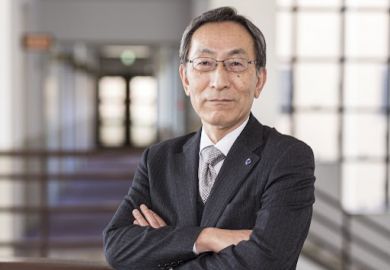Joseph Castro, chancellor of the California State University (CSU) system, has resigned amid allegations he mishandled a high-level sexual misconduct case while leading the CSU campus in Fresno.
The 23-campus CSU, in announcing Dr Castro’s departure after barely a year in office, said that it would also begin a systemwide review of its policies and practices concerning gender-based discrimination.
A career college administrator and grandson of farm workers from Mexico, Dr Castro agreed to step down two weeks after a USA Today investigation into his handling of the case of a senior Fresno State administrator accused of sexual harassment and creating an abusive work environment.
“I have been honoured to serve the California State University for more than eight years, including as its eighth chancellor, and the decision to resign is the most difficult of my professional life,” Dr Castro said in the CSU announcement.
“While I disagree with many aspects of recent media reports and the ensuing commentary, it has become clear to me that resigning at this time is necessary so that the CSU can maintain its focus squarely on its educational mission and the impactful work yet to be done,” he said.
The move comes one month after the University of Michigan fired its president, Mark Schlissel, over a consensual sexual relationship with an employee and reflects another attempt by US higher education to draw a firm line against abusive workplace environments.
At the same time, another high-profile case this month at Harvard University laid bare the limits of such efforts, as nearly three dozen faculty members signed a letter backing a professor with a decade-long record of sexual harassment accusations, before most of them agreed to retract it.
Dr Castro’s case centres on Frank Lamas, former vice-president of student affairs and enrolment at CSU’s Fresno campus, who was described in the USA Today investigation as having faced at least a dozen complaints over six years for behaviour that allegedly included touching and staring at women inappropriately, making sexist comments and belittling, berating and retaliating against employees.
The report said that Dr Castro, as president of the campus also known as Fresno State University, quietly signed off on a settlement in 2020 that let Dr Lamas leave the CSU system with a $260,000 (£190,000) retirement package and the promise of a letter of recommendation from Dr Castro for employment elsewhere.
Dr Castro was hired as CSU system chancellor three weeks later, without informing the system’s board of trustees about the investigation or the settlement. The letter of recommendation for Dr Lamas said that the “student experience at Fresno State will be forever improved because of Dr Lamas’ bold leadership”, the San Francisco Chronicle reported.
Dr Lamas has denied any wrongdoing.
CSU is the nation’s largest system of four-year higher education, with 477,000 students and 56,000 faculty and staff at its 23 campuses.
Dr Castro has publicly expressed his concern for victims of sexual assault. While leading Fresno State, he was among several university leaders at a December 2019 round table with journalists hosted by Arizona State University who voiced unease about proposed Trump-era changes that would force campus sexual assault victims to endure questioning from representatives of their alleged attackers. He described a case at Fresno where the fear of a formal cross-examination process resulted in two women not pursuing action against, and needing to return to campus with, a man who both had accused of assaulting them.
The chair of the CSU Board of Trustees, Lillian Kimbell, said in the announcement: “We appreciate chancellor Castro’s cooperation with the trustees and his decision to step down for the benefit of California State University system.”
The board, in reference to the 1972 federal law banning sex-based discrimination in education, said it now plans to “bring CSU to the forefront of Title IX innovation, accountability and response”.




